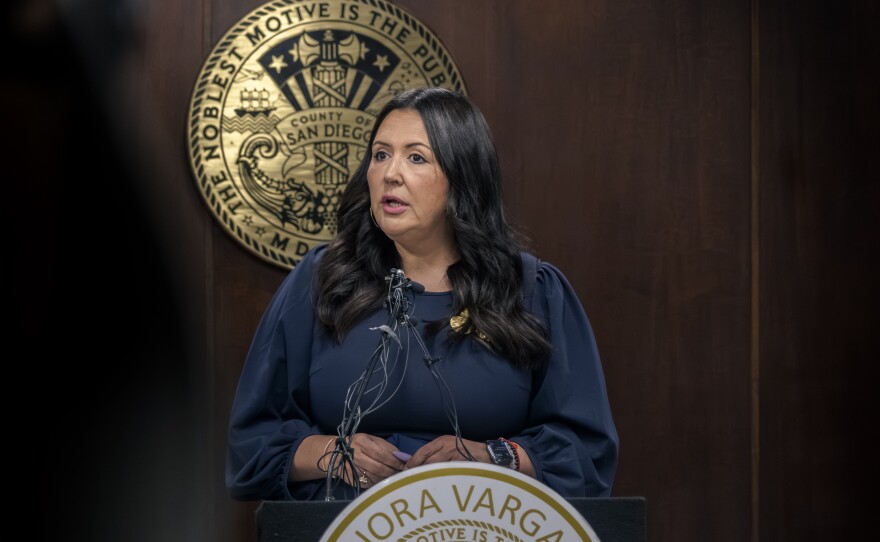County Board of Supervisors Chairwoman Nora Vargas held a news conference Wednesday to discuss the county's efforts to prepare for the end of Title 42, but ended the session abruptly as reporters pressed her for answers about security, shelter and funding.
At the start of the news conference, Vargas said helping asylum-seekers was an issue near to her heart, and mentioned her role in the creation of the San Diego Rapid Response Network to help asylum seekers in 2017, when she said there was a high number of people released to the streets.
Vargas noted a difference from that time:The Biden Administration plans to open regional processing centers across the Western Hemisphere. ”
“It's really intended to reduce the number of people that are coming into our borders,” she said. “People will have an opportunity to be processed at these centers and they're going to be able to get to their final destinations directly from there."
Vargas said local nonprofits have received $35 million from the federal government to help asylum-seekers, and three county working groups are meeting continuously to discuss resources and solutions. She said the groups also meet with cities, Customs and Border Patrol and nonprofits.
But she emphasized this is a federal operation, and said the county still had not secured adequate funding or resources in case local shelters are overwhelmed. She said a letter was being sent to the Biden Administration to request more aid, and not just for the immediate situation.
“We are looking at long-term solutions," Vargas said.
Medical care for asylum-seekers is also a concern. "County medical authorities are working with the federal and state authorities to monitor the capacity to adequately provide the medical screenings that migrants need to have,” Vargas said. “It's extremely important for us that everyone that is here is safe and healthy.”.
Vargas also said the Rapid Response Network is ready to provide resources to migrants, who may find themselves released on the street if shelters are out of room. She also said the 211 social services hotline is a good phone number to call for help.
"What's really important right now is that we share with folks that there is a place that if you see someone ... that you think, doesn't know where to go. They can call 211, you can call 211," she said.
But when KPBS pressed her on overflow locations and security concerns for communities and migrants who are vulnerable targets, she simply said, "We're working on that."
Other reporters also asked for more details on shelter locations and available beds and street releases, but Vargascut the news conference short and said her staff would get back to them with the answers.
As of Thursday morning, KPBS has not received those answers.
ORIGINAL STORY
As the pandemic-era federal Title 42 policy to block immigrants at the southern border is set to expire Thursday, officials around the county are preparing for an influx of asylum seekers.
County Board of Supervisors Chairwoman Nora Vargas has scheduled a news conference later Wednesday to discuss the county's efforts to prepare for the policy's end and "an update on the county's outreach efforts and partnerships to ensure migrants and asylum seekers can reach their destination safely."
Originally part of the 1944 Public Health Service Act, Title 42 allows two federal agencies — Border Patrol and U.S. Customs and Border Protection — to prohibit the entry of people who may pose a health risk.
As COVID-19 cases rose in March 2020, the U.S. Centers for Disease Control and Prevention issued a public health order allowing for rapid expulsion of unauthorized border crossers and asylum seekers. The U.S. Supreme Court under President Donald Trump continued to keep the restrictions in place.
Since it went into place, Customs and Border Protection has turned away more than 3 million asylum seekers. In April 2022, the CDC announced it would terminate the public health order in spring 2023.
President Joe Biden sent an additional 1,500 troops to the border last week in preparation for the end of Title 42. Around 16,000 migrants are waiting in Tijuana for the border restrictions to be lifted, KPBS reported.
Other local leaders are concerned about the impact of the thousands of refugees and asylum seekers likely to cross the border into the United States in the coming days and weeks. El Cajon Mayor Bill Wells sent a letter on Wednesday to the White House asking for federal assistance and intervention to help handle the influx.
"I am told that about 1,000 people per day may enter San Diego County, with about 25% of them being dropped off at a light rail station in El Cajon," Wells wrote. "After speaking with Customs and Border Protection staff, my staff said that our small city would have between 300 and 500 asylum seekers left in El Cajon to fend for themselves.
- ICE is reversing termination of legal status for international students around US, lawyer says
- Advocates urge San Diego Sheriff to reconsider stance against county sanctuary policy
- ICE is reversing termination of legal status for international students around US, lawyer says
- Advocates urge San Diego Sheriff to reconsider stance against county sanctuary policy
"I expect to see these people with no credit cards or bank accounts and limited cash, which puts them in a precarious position regarding securing safe temporary housing," Wells wrote. "I expect these people may need psychological and/or medical intervention and will likely be exhausted, hungry, and disoriented."
Wells said he was sympathetic to those asylum seekers, but with the city dealing with its own homelessness crisis, those coming in would be left without resources.
"I am concerned that without Federal intervention, our current crisis, which takes our resources to an extreme level, will precipitate a full crisis," he wrote. "El Cajon is not equipped to be a refugee center."
In February, the county Board of Supervisors called on the chief administrative officer Helen Robbins-Meyer to develop a plan and identify possible actions to "ensure asylum seekers entering the U.S. will not add to the region's current homeless crisis."
"Now, more than ever, we should lead the way in building a just and humane immigration system that rises to meet the challenges of the current situation around the world," Chairwoman Vargas said in a statement after the February vote.
-
Title 42 is set to end Thursday, and a large wave of migrants are expected to flood the border seeking asylum. In other news, families who have lost loved ones gathered in Mission Valley for Fentanyl Awareness Day Tuesday. Plus, the child care industry is struggling with not having enough staff.
-











